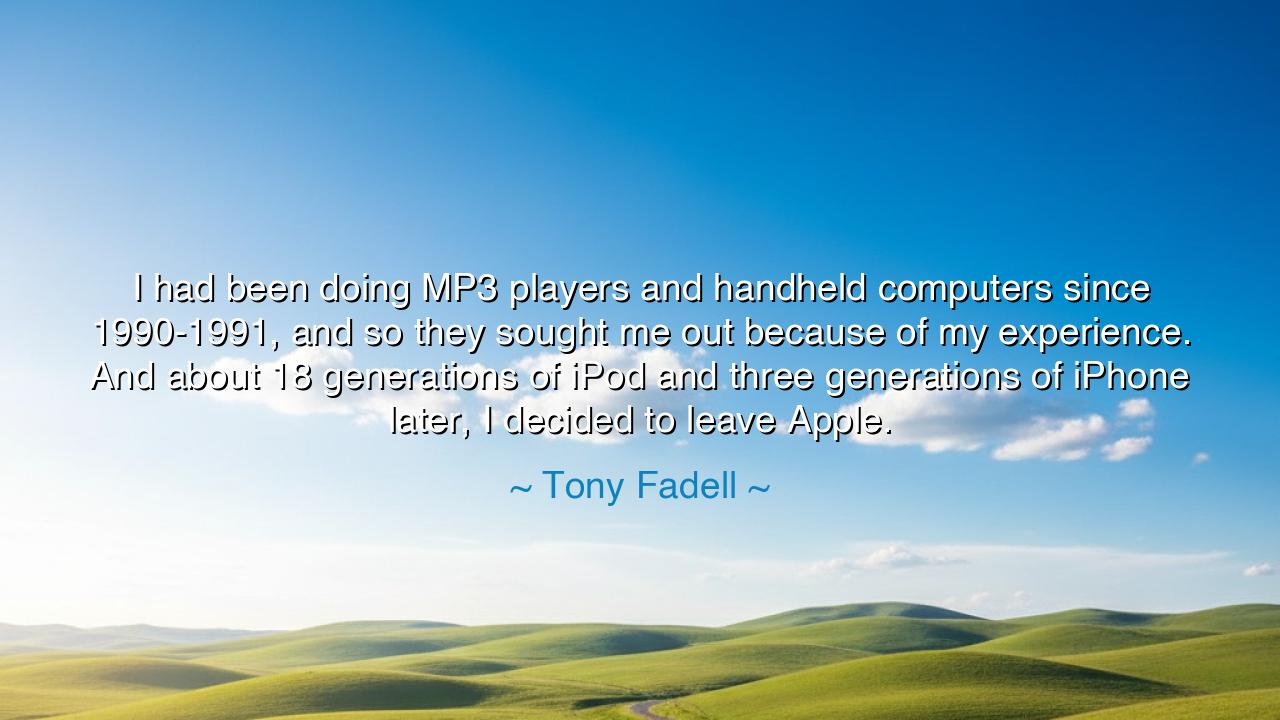
I had been doing MP3 players and handheld computers since
I had been doing MP3 players and handheld computers since 1990-1991, and so they sought me out because of my experience. And about 18 generations of iPod and three generations of iPhone later, I decided to leave Apple.






Listen, O children of the earth, to the words of Tony Fadell, who speaks of his journey through the evolution of technology: "I had been doing MP3 players and handheld computers since 1990-1991, and so they sought me out because of my experience. And about 18 generations of iPod and three generations of iPhone later, I decided to leave Apple." These words reflect not only the sweeping change that technology has undergone, but also the deeply human experience of growth, creativity, and the eventual need to move on from the very creations that once defined us. Fadell’s decision to leave Apple, after his involvement in such monumental innovations, speaks to the journey of the creator—the recognition that progress sometimes requires departure, and that innovation often leads us to places where we must continue our work in new ways.
In the ancient world, the act of creation was not seen as something static. To create was to bring forth something from the depths of imagination and vision—and that act of creation was often accompanied by the need to evolve. Consider the story of Hercules, the great hero who, after accomplishing many feats, found himself constantly called to greater challenges. His labors, though monumental, were only part of his journey. At each stage, he was confronted with the need to move beyond what he had achieved, seeking new paths and greater purpose. Fadell’s journey is similarly a reflection of this ancient truth: creation is a continuous journey of evolution, not a final destination.
Fadell’s experience with Apple, spanning the development of MP3 players, iPods, and iPhones, mirrors the journey of many great innovators throughout history. Like Da Vinci, whose genius spanned multiple disciplines—painting, engineering, and anatomy—Fadell’s ability to adapt and reinvent himself over the course of 18 generations of iPods and several iterations of the iPhone speaks to the fluidity of creation. Da Vinci did not rest on the laurels of his earlier works; he sought always to evolve, constantly seeking new challenges and new ways of creating. In the same way, Fadell’s decision to leave Apple after such monumental success shows that even the most profound achievements are just stepping stones to new opportunities.
The act of leaving behind something so groundbreaking and world-changing as the iPhone may seem counterintuitive, yet it reflects the wisdom of the ancients. Socrates famously taught that the pursuit of wisdom is an endless journey, one that requires constant reflection and change. Fadell’s departure from Apple echoes this idea: after having contributed so much to the advancement of technology, he recognized that his role had evolved, and that his next step lay beyond the boundaries of the company that had defined his career. The lesson here is one of growth and renewal—that innovation and creativity demand that we embrace change, and sometimes, leave behind even our greatest successes in order to continue the journey toward something greater.
In your own lives, O seekers of wisdom, remember that the path of creation and achievement is never linear. Just as Fadell contributed to the development of some of the most revolutionary devices in history, but recognized when it was time to move on, so must you understand that success is not a destination but a process. The moment you stop evolving, you risk becoming stagnant. The lesson is not only about innovation, but about recognizing when it is time to move forward, to let go of the past, and to pursue new challenges. Just as Fadell sought out new horizons after Apple, so must you seek out the next phase of your own journey when the time is right.
Consider the story of Galileo, whose work in astronomy fundamentally changed our understanding of the universe. After discovering that the earth revolved around the sun, he faced opposition and resistance from the establishment. Yet, despite these challenges, Galileo continued his work and ultimately moved beyond the boundaries of accepted thinking. Like Fadell, Galileo did not rest on his laurels. He recognized that progress often requires departure—leaving behind old ideas in favor of new ones, even when the path is uncertain.
The lesson for us all, O children of the earth, is one of purpose and vision. Fadell’s journey reminds us that creators must always evolve and seek new challenges, even after achieving great things. The greatest works of life are often the result of continuous reinvention, of never being satisfied with the present, and always pushing forward to the next great idea. Let Fadell’s example inspire you to embrace change, to see your successes not as final destinations but as stepping stones on the ever-unfolding path of growth, creativity, and innovation. Just as the ancients knew, the journey of creation never truly ends—it is a constant cycle of learning, creating, and moving forward.






AAdministratorAdministrator
Welcome, honored guests. Please leave a comment, we will respond soon